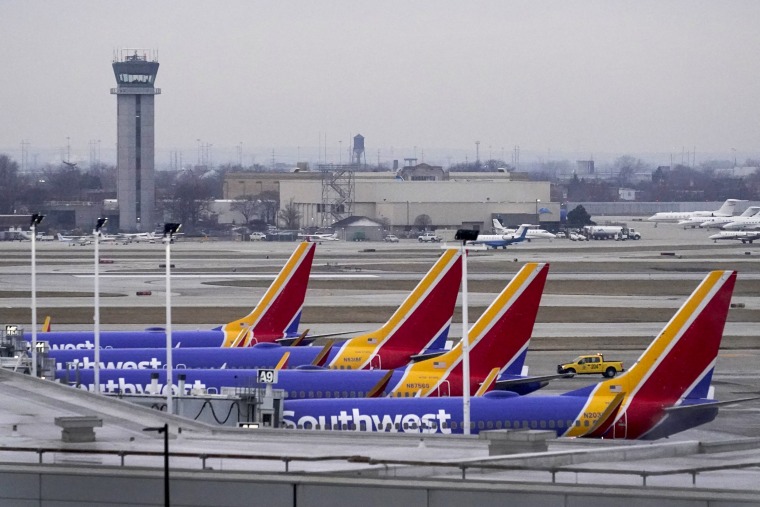Wednesday was another day to forget for U.S. airline passengers, as a technology issue at the Federal Aviation Administration grounded flights nationwide.
While all airlines were affected, one stood out as the grounding of domestic flights had a cascading effect on air travel: Southwest Airlines. According to the flight tracking company Flight Aware, Southwest had as many as 49% of its flights delayed as of noon Wednesday.
That compares with 48% for American Airlines, 40% for United, 38% for Delta, and 33% for JetBlue.
Anuvu, another site that tracks flights, showed just 7% of Southwest flights were departing on time, compared with 15% for American Airlines, 21% for United Airlines, and 33% for Delta Airlines.
Southwest is still reeling from the huge disruption it experienced over the Christmas holiday that saw an estimated 11,000 of its flights canceled. This week, it pinned the cost of the fiasco at upward of $800 million.
In a statement, Southwest said that while it was fully staffed and operating as many flights as possible on Wednesday, "we expect delays across our system on this day shortened by the FAA ground stop that pushed the departure of our first flights on the East Coast by two to three hours."
The airline acknowledged it had also proactively canceled flights early before the ground stop was lifted.
"There is no concern higher than safety and accurate, timely information from the FAA," it said.
The scale of transformation that Southwest must undergo to correct the issues that led to the holiday meltdown will require much more than a week to undertake, said Henry Harteveldt, president and travel industry analyst at the Atmosphere Research Group.
Still, he called the airline's outsize delays Wednesday "troubling." He said Southwest's "point-to-point" flight routing process, which allows the airline to fly a greater volume of passengers but which can create a cascade of delays, could be to blame.
Southwest also operates a crew scheduling system that was not designed to handle its current daily volume of flights, said Michael Boyd, president of the Boyd Group International aviation consultancy.
"When they were a simpler airline, you could make a phone call," Boyd said. "You can’t do that with 700 airplanes going across all of North America. ... They've invested in a new customer reservation system, but [crew scheduling] is one area they haven't gotten to."
Southwest said Wednesday it would rebook customers on the next available Southwest flight with seats available to the customer’s ticketed destination, at no additional cost.
For customers who choose not to travel after a cancellation or significant delay, Southwest said it would issue a refund of the unused portion of the ticket upon request in accordance with its contract of carriage.

